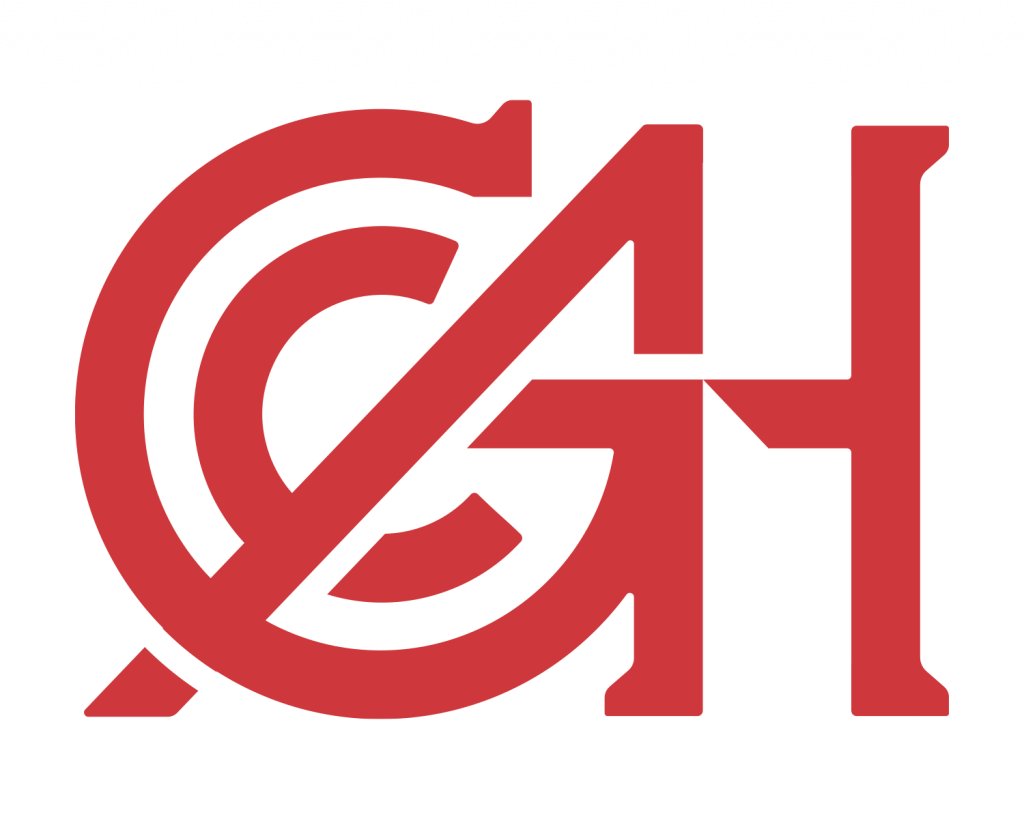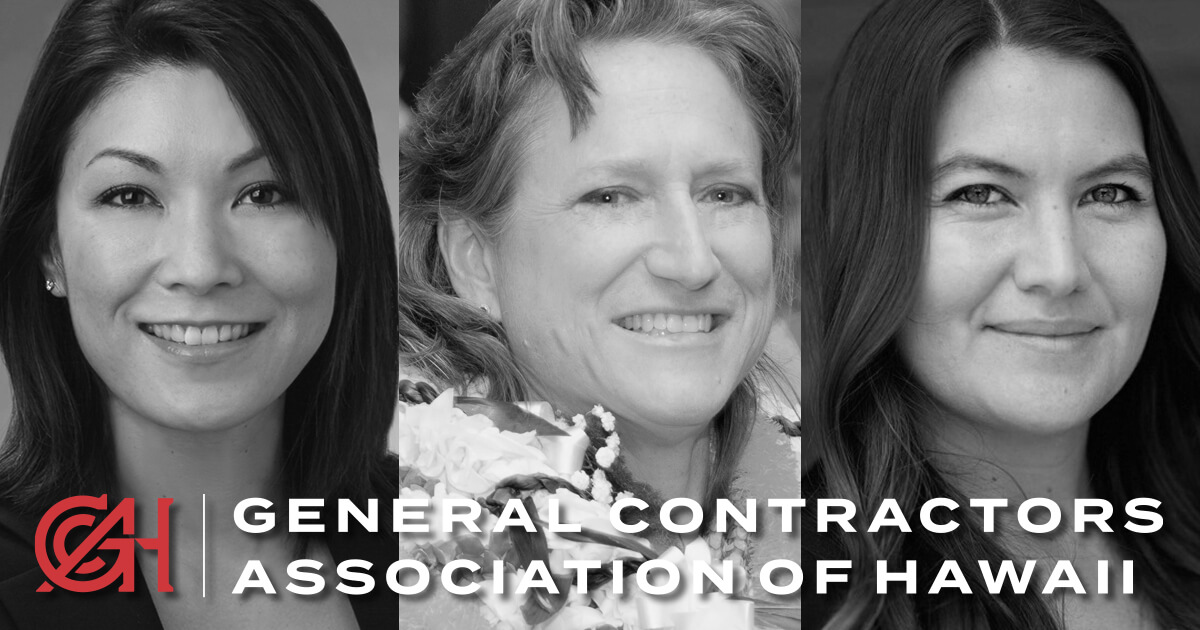
GCA Women Members Leading the Way
Barriers and ceilings are meant to be broken. We’re celebrating Women in Construction Week. Three GCA members, who are women leaders in construction, share how they have succeeded in the male-dominated construction industry and freely offer advice for other women in the construction industry.
Marnie Koga Hursty, President, Mega Construction and 2013 GCA President; Tracy Lawson, President and Founder, Lawson & Associates, Inc., and and Co-Founder of the Safety Intelligence Institute; and Hina Schipa, President and CEO, Buck Roofing, each shared thoughtful responses to our questions.
Q: As a woman, what are some challenges of leading/owning a construction company?
Marnie:
For me, there is definitely an intimidation factor. No one has made me feel inadequate or unqualified being in the construction industry. It is just something that I feel on my own because there are not many women leaders. Because of this, I encourage women who are in construction or would like to enter the industry. I want them to be confident and don’t want them to sell themselves short, because they can do it! I have had a few women project managers at Mega, and I took it upon myself to work with them to not lose that confidence.
Hina:
It can be hard inserting yourself and networking when in a male-dominated industry. Just getting yourself in those circles can be uncomfortable and a challenge. It is easy to feel like you are not being taken seriously and second guessed when you are one of the few women in the room or on the project.
Tracy:
We are a safety support services firm that supports construction companies ranging from small to mega-size projects. I don't see my business challenges as different from anyone else's. If you look for challenges because you are a woman, you will find them. I believe when you demonstrate a strong, consistent work ethic and provide value-added service, and ensure your work is built on technical accuracy, the right people will want to work for and with you because of who you are, regardless of gender.
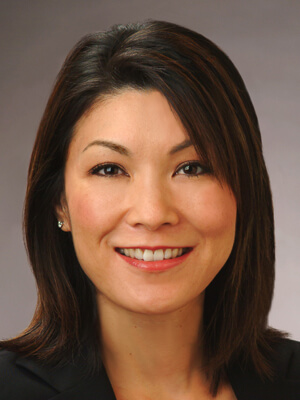
“Because of this, I encourage women who are in construction or would like to enter the industry. I want them to be confident and don’t want them to sell themselves short, because they can do it!”
Marnie Koga Hursty
President
Mega Construction
Q: What are some advantages?
Tracy:
We are a certified woman and veteran-owned business. These certifications help our clients meet their hiring goals for their projects. However, I am unaware of any work we have won because of these certifications. Regardless, it is important to be continuous learners, believe in your work, and seek to make a difference for your clients and community. Doing those three things will give you an advantage.
Hina:
Being able to get certified as a WOSB (Women Owned Small Business) & WBE (Women Business Enterprise) gives you opportunity to take advantage projects being set aside for women owned businesses. Being underestimated can also have its advantages, it gives me motivation to really prove myself.
Marnie:
One advantage is the management style of women, which is very different from men. Women take on a team approach that involves employees’ sharing of ideas and prioritizes the importance of working together. Personally, I find it important to collaborate ideas with both the field personnel and office personnel. Sitting together to discuss challenges that occur on our projects bring out the best solutions. It empowers individuals with a ‘buy in’ attitude. This also encourages more communication so that employees are not afraid to approach me with their ideas and concerns.
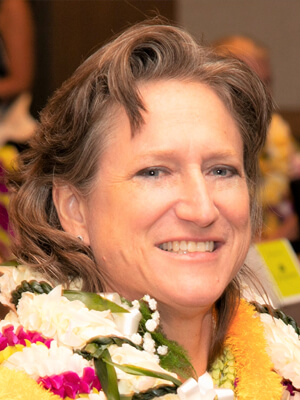
“Regardless, it is important to be continuous learners, believe in your work, and seek to make a difference for your clients and community. Doing those three things will give you an advantage.”
Tracy Lawson
President and Founder
Lawson & Associates, Inc.
Q: How did you get into the construction industry?
Marnie:
Initially, it was never my plan to work in the construction industry as a young adult. However, I had a change of heart in 2001 and convinced my father (Marvin Koga) to give me a chance and work for him. My father started Mega in 1984 and was the President until his passing in 2006. Over the course of those five years of working under him, I learned a lot. Although it wasn’t easy, I decided to continue operating Mega after he passed. There have been many highs and lows, but I do not regret it!
Tracy:
When I left the Army, I worked in the Hawaii office of my father's construction company. I did some estimating and work as an office engineer, and eventually, I ran the scaffolding crew. However, that was all short-lived when the insurance company told us we had to improve our safety or our coverage would be canceled. I was given the task of solving our safety issues and found it to be both rewarding and challenging. I am thankful for the opportunities I have been given; I love construction and the challenges and rewards the industry offers.
Hina:
My father started Buck Roofing 47 years ago so I grew up around construction. Some of my earliest memories are using old plan sets for arts and crafts in my dad's office. After my first year in college, I came back to work for Buck Roofing over the summer. I enjoyed seeing my father’s work around the community and decided I wanted to continue his legacy. While I was in my second year in college my father passed away. I finished my BS in Construction Management and Masters in project management then moved home to run the company.
Q: As a woman, did you find it difficult to break into the industry?
Tracy:
When I first started in construction, I was working for my father's construction company. I had just come from being in the Army as a military police traffic accident investigator when I entered the construction industry. Frankly, I had no focus or concept of being unable to do something because of my gender. I found it more challenging to be accepted as a good employee on my own merit rather than just because my father owned the company. I had to listen, learn and gain the respect of the crews and managers in our company and show them that I deserved to be there. I worked hard, respected everyone's role and contribution to the building process, and learned everything from each person and assignment – good or bad. It did not take long for people to stop talking about whom I was related to and start talking with me about work and getting the job done. Everyone faces the challenge of being accepted and learning to contribute to a team—the people who listen and learn the most are the ones who will go the farthest.
Hina:
My story is a little unique since the company was already established when I entered the industry. When I started running the company, I made it a point to reach out to all of our clients and introduce myself and let them know that Buck Roofing is still around and here to stay. I think this made it easier but I also had to prove that we would perform just as well as when my dad was running the company.
Marnie:
Because I am the second generation of Mega, I am very fortunate that my father paved the path for me. However, with that being said when I reflect upon the transition of stepping into his shoes rather suddenly and unexpectedly, it was quite a rough road. I was forced into a decision of sink or swim. But like anything else, it is challenges like this that make one realize how tough they can be. I will always be grateful for the opportunity that my father gave to me.
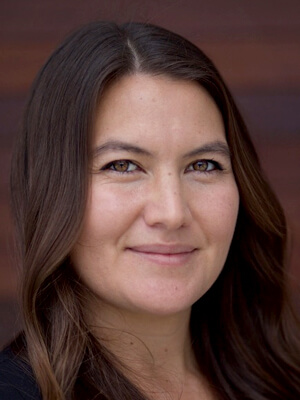
“When I started running the company, I made it a point to reach out to all of our clients and introduce myself and let them know that Buck Roofing is still around and here to stay.”
Hina Schipa
President and CEO
Buck Roofing Company
Q: Any advice you would give to future women wanting to enter the industry?
Tracy:
It's wonderful being a woman, and you should always be true to who you are. However, realize you are more than your gender. You have value to add and can contribute in more ways than you currently imagine. Focus on who you are and who you want to become. Gain perspective, discover your blind spots, and stop thinking everyone is just like you. Put in the conscious effort to be a continuous learner. Know your trade better than anyone else. Know how to listen and communicate with all types of people. Study how people think, act and talk with one another. Be strategic and always make people feel good in your presence.
Hina:
Network as much as possible even if you are uncomfortable with it. There are a lot of groups, programs, and events out there that are geared toward helping women in male-dominated industries. Groups such as NAWIC (National Association of Women in Construction) or leadership programs at the YWCA or events at the GCA. It is so helpful to surround yourself with people you can relate to and create a support system.
Marnie:
My father would emphasize to me the importance of passion for the industry. For without it, he would say, you are not going to survive. Now that I have worked in construction for over 20 years I wholeheartedly agree. This is a tough industry with a multitude of challenges and risks. But with risk, there is reward. However, it is the passion that will motivate you when times get hard and in the construction industry, there will always be hard times. The highs and lows are guaranteed to happen, but if you love what you do, you will be tough enough to weather the storms.
We hope you enjoyed this featured article! Comments or feedback? Send an email to communications@gcahawaii.org.
Mahalo!
